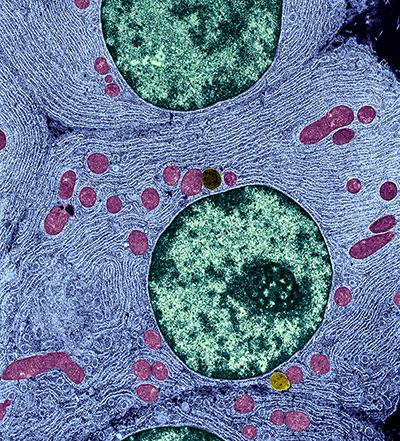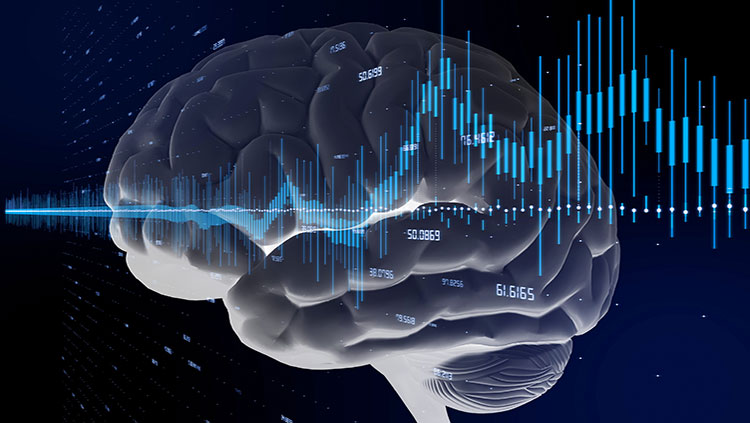
Our brains change in subtle but measurable ways as we age. Neurons retract the branched extensions that receive chemical messages and parts of the cerebral cortex shrink.
But what causes these changes? There are many different theories about why neurons, and cells in general, age. They include:
Oxidative Stress and DNA Damage
Changes in gene expression may play a role in neuronal aging. Genes involved in synaptic plasticity are less active in the brains of older people than in the brains of younger adults. And, these genes typically show more signs of damage.

DNA damage accumulated over a lifetime could contribute to aging processes throughout the brain and body. Every cell in your body contains organelles called mitochondria, which function like cellular power plants, carrying out chemical reactions that provide energy. Some of these metabolic reactions produce harmful byproducts called free radicals — highly reactive molecules which, if left unchecked, can destroy fats and proteins vital to normal cell function and can damage DNA as well. Your body has natural defense mechanisms to neutralize free radicals and prevent the oxidative stress they cause. Unfortunately, these defenses weaken with age, leaving aging tissues more vulnerable to oxidative damage.
Studies in humans and rodents suggest oxidative damage contributes to the age-related decline in memory and cognitive ability. Rodents with more oxidative damage perform worse on memory tests, and people with mild cognitive impairment and Alzheimer’s disease show more signs of oxidative damage in their brains compared to healthy people.
Your brain is one of the most metabolically active organs, demanding around 20% of the body’s oxygen and fuel. Its enormous energy requirements might make the brain even more vulnerable than other tissues to the metabolic changes that occur in aging. While the brain’s energy demands remain high, its energy supply can no longer keep pace; the brain’s ability to take up and use glucose diminishes and mitochondrial metabolism declines.
Immune Dysfunction
Immune system disruptions often occur in conjunction with the metabolic changes seen in aging. Microglia, the brain’s predominant immune response cells, perform many important jobs: defending against pathogens, cleaning up cellular debris, and helping maintain and remodel synapses. These inflammatory responses are protective, but a prolonged inflammatory state is harmful to brain health.
Microglia become more reactive with age, increasing the inflammatory response in the brain while also damping production of helpful anti-inflammatory molecules. Studies in mice suggest excessive microglia activity can impair cognitive abilities.
Impaired Protein Recycling
Cells normally break down and recycle damaged proteins and molecules. However, this process isn’t perfect, and, over time, damaged molecules can build up in cells and prevent them from functioning normally. For example, in Alzheimer’s disease, defective proteins build up and clump together in the brain. Amyloid proteins accumulate into plaques outside brain cells, and tangles of tau protein form within brain cells.
Buildup of proteins and other cell components also contributes to cellular degeneration in the healthy brain. Because neurons in the brain are not replaced as often as cells in other parts of the body — like bone marrow, intestinal lining, and hair follicles — brain cells might be even more vulnerable to this buildup of damaged molecules. Also, the cellular machinery involved in breakdown and recycling processes degrades with age, reducing the efficiency of the “waste removal” systems.
While some of the changes that happen in the brain are a normal, inevitable part of the aging process, that doesn’t mean they’re completely out of our control. Poor cardiovascular health, for example, likely contributes to changes seen in the aging brain. On the flip side, the things that are good for your heart — eating a healthy diet, exercising, and reducing stress — can also benefit your brain as you age.
This article was adapted from the 8th edition of Brain Facts by Alexis Wnuk.
Content Provided By
BrainFacts/SfN
References
Gemma, C., Vila, J., Bachstetter, A., & Bickford, P. C. (2007). Oxidative Stress and the Aging Brain: From Theory to Prevention. In D. R. Riddle (Ed.), Brain Aging: Models, Methods, and Mechanisms. Retrieved from http://www.ncbi.nlm.nih.gov/books/NBK3869/
Keller, J. N., Schmitt, F. A., Scheff, S. W., Ding, Q., Chen, Q., Butterfield, D. A., & Markesbery, W. R. (2005). Evidence of increased oxidative damage in subjects with mild cognitive impairment. Neurology, 64(7), 1152–1156. doi: 10.1212/01.WNL.0000156156.13641.BA
Lu, T., Pan, Y., Kao, S.-Y., Li, C., Kohane, I., Chan, J., & Yankner, B. A. (2004). Gene regulation and DNA damage in the ageing human brain. Nature, 429(6994), 883–891. doi: 10.1038/nature02661
Terman, A., & Brunk, U. T. (2004). Aging as a catabolic malfunction. The International Journal of Biochemistry & Cell Biology, 36(12), 2365–2375. doi: 10.1016/j.biocel.2004.03.009
Yin, F., Sancheti, H., Patil, I., & Cadenas, E. (2016). Energy Metabolism and Inflammation in Brain Aging and Alzheimer’s Disease. Free Radical Biology & Medicine, 100, 108–122. doi: 10.1016/j.freeradbiomed.2016.04.200





.jpg)











